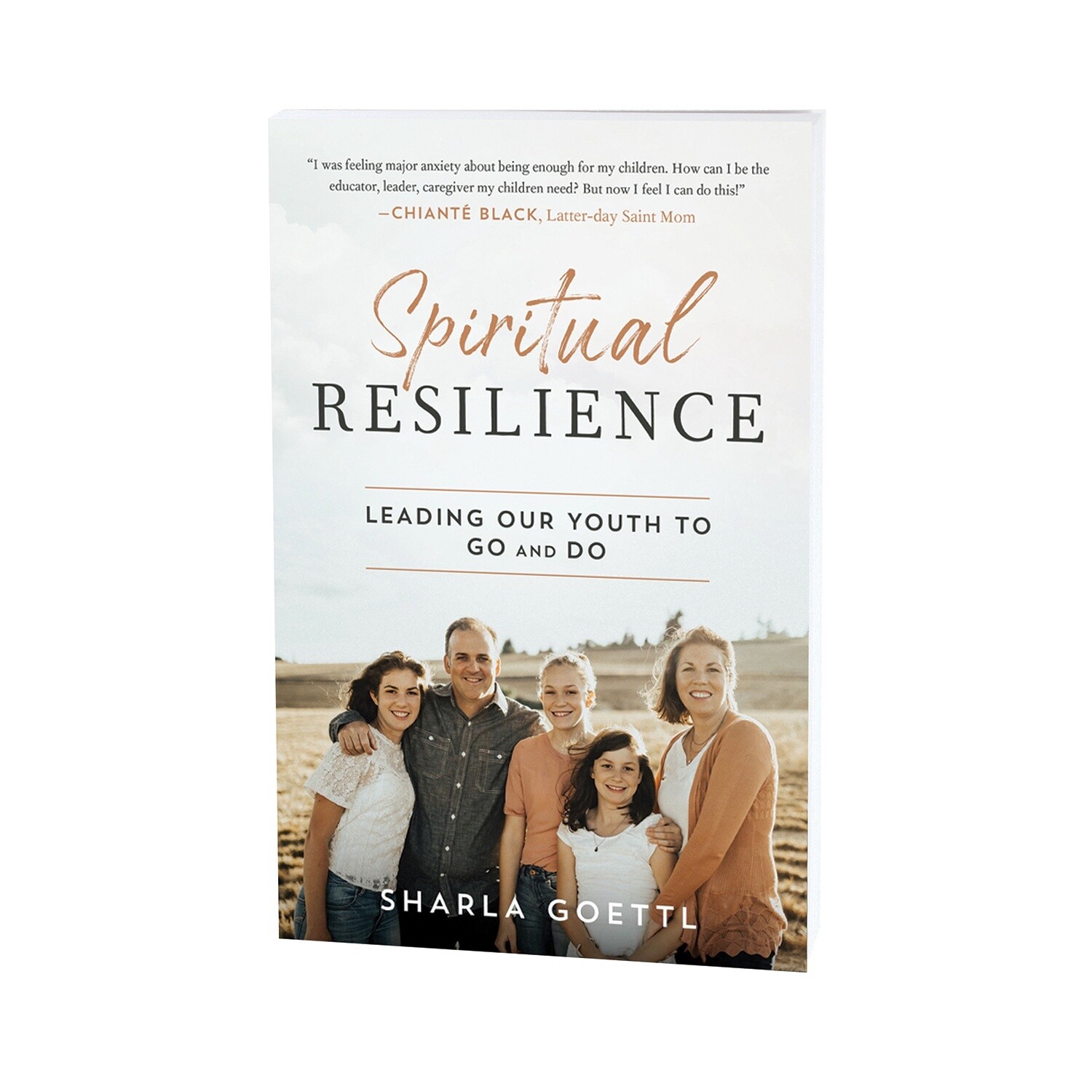Spiritual Resilience
by Sharla Goettl
Latter-day youth and parents need spiritual resilience to face the future head-on. But how do you get it? How do you teach it? Nephi had these same questions. His answers will impact how you teach your children to follow Christ.
Where did Nephi get the spiritual resilience sufficient to do what he did? As a teenager, how did Nephi develop one of the strongest testimonies we know of?
I can say with certainty that Nephi’s story is a powerful guide that can help parents on our own spiritual journey, as well as help our youth.
CHAPTER EXCERPTS
GOODLY PARENTS
“Behold, I say unto you, Yea; they shall be remembered again among the house of Israel; they shall be grafted in, being a natural branch of the olive tree, into the true olive tree…
Wherefore, our father hath not spoken of our seed alone, but also of all the house of Israel.” (1 Nephi 15:13–16, 18, emphasis added)
Our children also will be taught and gathered by their Savior.
Nephi knew the choices of his brothers would be consequential. He also knew he could not force his brothers to believe in the promises of Christ. Nephi knew he loved his brothers and wanted them to feel the joy and reassurance he felt through Christ. Therefore, his first takeaway from experiencing that mighty vision was to teach his brothers they were loved by God and would never be forgotten.
What does this teach us about how to treat our children? What example is set for us as we consider our effect on our posterity? Essentially, what is our measure of success? We cannot make decisions that our children must make for themselves. We can teach them “with all the feeling of a tender parent” (1 Nephi 8:37) the importance of the gospel. More importantly, we can make sure they know we love them. We can teach them that their Father in Heaven will always love them and wants to help them. We can commit to teaching the gospel in any way possible, knowing many hardships can be avoided through obedience.
CAN YE DOUBT?
What is spiritual resilience? It’s a measure of strength, single-mindedness, hope, determination, and endurance that consistently answers the Savior’s call for action.
Spiritual resilience is what allowed Daniel to walk into the lion’s den and prompted the boy Samuel to answer, “Speak; for thy servant heareth” (1 Samuel 3:10). It is the virtue that inspired Mary to testify with such grace and self-assurance. It is the wise resolve that kept Mormon morally clean despite his surroundings. It is the fearless trait that allowed David to stand his ground while holding nothing more than a rock and sling in his hands. Esther gathered her spiritual resilience through the support of her people before risking her own life to save theirs. Isaac climbed onto the sacrificial altar with more than blind obedience.
Each of these heroes had a spiritual resilience that anchored them in their trust of God. They were young, yet they were led by the Holy Ghost. They were inexperienced and imperfect, yet they were not overwhelmed by their role in God’s work. They all chose to take a confident step forward. Live or die, these young people must have made a decision similar to one spoken about some millennia earlier by the mighty prophet Enoch:
“Choose you this day, to serve the Lord God who made you.” (Moses 6:33)
An understanding of who Christ is, what He is capable of, what we owe Him, and what He wants for us can give us the resolve to follow Him and the endurance we need to weather the trials that come our way.
GO AND DO
You don’t need to integrate every program in an ideal way from the beginning. The ideal way forward for your family each week or each month is to do what the Holy Ghost advises within the revealed framework. The point is for us to focus on the goals taught by our prophet and move continually forward. How grateful I am for a new, inspired vision designed to bring each of us closer to our most helpful friends, Jesus Christ and the Holy Ghost. Set a goal you can reach, reach that goal, then repeat.
It doesn’t matter where you start. Your progress is measured by your actions. As you more thoughtfully and purposely turn your actions toward your Savior, the change in you becomes obvious. Your children need to see greater commitment from you. Children who believe their parents are trying to follow Christ are positively impacted whether their parents are just beginning or . . . well, let’s be honest—we’re all in the beginning stages relative to Christ!
I love this scripture: “And why call ye me, Lord, Lord, and do not the things which I say?” (Luke 6:46) If we ask for Christ’s help, we should do exactly what He tells us to “go and do.” It’s the most effective way to reach our highest goals.
Christ created the earth and all that is in it. At the beginning of each day He received direction from His Father on how to do so. He carried out His task one day at a time. He was never in doubt that His direction came from God. He never doubted the wisdom or sequence of the direction He was given. He did not assume the task was greater than what He could complete, nor should we.
FOR I KNOW
I’ll highlight five key phrases within 1 Nephi 3:7 to help you understand the building blocks of Nephi’s strength.
I will—Nephi was willing to promise. What have you promised to do?
Go and do—Nephi acted on what the Lord asked of him. What is asked of you?
For I know—Nephi knew why he was following Christ. Why do you follow Him?
He shall prepare—Nephi trusted the Lord. What has Christ prepared for you?
That they may accomplish— Nephi accomplished eternal outcomes. Can you recognize the significance of the spiritual direction you are given?
Nephi’s verse requires us to ask deeply personal questions of ourselves—questions that will help us know where we need to focus to build spiritual resilience and, in turn, help our children to do the same.
My progress is made most quickly through heavenly answers to my mortal questions. If you do not have an answer to any of these questions, it’s okay to say, “I don’t know,” or even, “I have never known.” Doing so indicates where to start your focus. My hope is to be helpful as you find your own path forward from exactly where you are right now in your own situation.
Perhaps you already have answers to these questions based on your spiritual experience. Share these insights with your children, then let them come up with their own answers to these questions.






